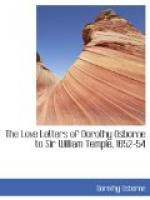’Tis such an ease (as you say) not to be solicitous to please others: in earnest, I am no more concerned whether people think me handsome or ill-favoured, whether they think I have wit or that I have none, than I am whether they think my name Elizabeth or Dorothy. I would do nobody no injury; but I should never design to please above one; and that one I must love too, or else I should think it a trouble, and consequently not do it. I have made a general confession to you; will you give me absolution? Methinks you should; for you are not much better by your own relation; therefore ’tis easiest to forgive one another. When you hear anything from your father, remember that I am his humble servant, and much concerned in his good health.
I am yours.
Letter 38.—Lady Isabella is Lady Isabella Rich, my Lady Diana’s eldest sister. She married Sir James Thynne. Many years ago she had an intrigue with the Duke of Ormond, by whom she had a son, but Dorothy speaks, I think, of some later scandal than this.
My Lady Pembroke was the daughter of the Earl of Cumberland. She first married Richard Earl of Dorset, and afterwards the Earl of Pembroke. She is described as a woman whose mind was endowed by nature with very extraordinary attributes. Lord Pembroke, on the other hand, according to Clarendon, pretended to no other qualification “than to understand horses and dogs very well, and to be believed honest and generous.” His stables vied with palaces, and his falconry was furnished at immense expense; but in his private life he was characterized by gross ignorance and vice, and his public character was marked by ingratitude and instability. The life of Lady Pembroke was embittered by this man for near twenty years, and she was at length compelled to separate from him. She lived alone, until her husband’s death, which took place in January 1650. One can understand that they were entirely unsuited to each other, when Lady Pembroke in her Memorials is found to write thus of her husband: “He was no scholar, having passed but three or four months at Oxford, when he was taken thence after his father’s death. He was of quick apprehension, sharp understanding, very crafty withal; of a discerning spirit, but a choleric nature, increased by the office he held of Chamberlain to the King.” Why, then, did the accomplished Lady Anne Clifford unite herself to so worthless a person? Does she not answer this question for us when she writes that he was “the greatest nobleman in England”?
It is of some interest to us to remember that Francis Osborne, Dorothy’s uncle (her father’s youngest brother), was Master of the Horse to this great nobleman.
Whether Lord and Lady Leicester were, as Dorothy says, “in great disorder” at this time, it is impossible to say. Lady Leicester is said to have been of a warm and irritable temper, and Lord Leicester is described by Clarendon as “staggering and irresolute in his nature.” However, nothing is said of their quarrels; but, on the other hand, there is a very pathetic account in Lord Leicester’s journal of his wife’s death in 1659, which shows that, whatever this “disorder” may have been, a complete reconciliation was afterwards effected.




